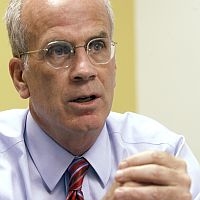 (Host) Congressman Peter Welch says it’s critical for Congress to pass a campaign finance reform bill that will regulate this year’s elections.
(Host) Congressman Peter Welch says it’s critical for Congress to pass a campaign finance reform bill that will regulate this year’s elections.
Welch voted for a bill, adopted by the U.S. House, that contains new disclosure requirements for corporations and labor unions.
VPR’s Bob Kinzel has more.
(Kinzel) The legislation is a direct response to a recent U.S. Supreme Court decision that recognizes corporations and labor unions as individuals when it comes to first amendment rights.
Under the ruling, these groups can spend an unlimited amount of money on a political campaign as long as the expenditure is made independent of a specific candidate.
The House backed the bill by a vote of 219 to 206 – most Democrats voted for it – virtually all the Republicans voted against it.
(Kinzel) The legislation includes new disclosure requirements for political ads. CEOs of corporations or unions would have to appear on the ad and newly created interest groups would have to disclose their major funding sources. Welch says he strongly supports this approach:
(Welch) "It’s become very common for groups to hide behind bogus groups – you know, ‘Americans for Clean Oceans’ could be sponsored by BP. Now if we know if voters know that BP is the big donor, they can put that into context and decide whether they want to believe it or not. So this is fundamentally about giving voters information that’s relevant to them for them to make their own independent decision on their vote."
(Kinzel) Some critics of the bill are upset that the legislation, if ultimately passed by the Senate, would apply to this year’s election. But Welch says it’s essential to implement the law as soon as possible:
(Welch) "Otherwise we’re going to have this election polluted by corporate money… There’s already a lack of confidence and credibility among a lot of people about the political process. But if you can have cynical ads that are sponsored by polluters saying that they’re environmentalists that’s just going to make people even more wary."
(Kinzel) In an effort to attract more votes, Democratic leaders exempted large advocacy groups, like the N.R.A. from the new reporting requirements. Welch says he opposes these exemptions but he argues that keeping the status quo in place would be far worse:
(Welch) "These organizations, incidentally, have been around ten years and they have a minimum of 500,000 members. They do have some grassroots credibility obviously. The corporations, what they have is money and if they hide behind money – because they’ve now been treated as though they are an individual exercising speech as the Supreme Court is enabling them – that has the potential to wreak havoc with the political system."
(Kinzel) The legislation now goes to the Senate where Democratic leaders say it faces an uncertain future.
For VPR News, I’m Bob Kinzel in Montpelier.